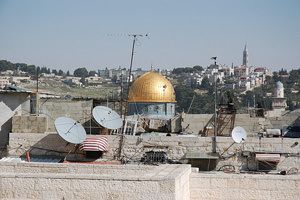Jerusalem Jews Tell Elie Wiesel to Get Real
You may recall Nobel Prize winner Elie Wiesel’s letter urging President Barack Obama to lay off of Jewish settlements in Jerusalem. A group of prominent intellectuals who actually live in the city have written their own withering response, calling Wiesel’s letter a fantasy “replete with factual errors and false representations.”
You may recall Nobel Prize winner Elie Wiesel’s letter urging President Barack Obama to lay off of Jewish settlements in Jerusalem. A group of prominent intellectuals who actually live in the city have written their own withering response, calling Wiesel’s letter a fantasy “replete with factual errors and false representations.”
The Guardian:
An extraordinary row has broken out between Elie Wiesel, the Holocaust survivor, author and Nobel peace prize winner, and a group of Jewish residents of Jerusalem over who speaks for the future of the disputed city.
Wiesel prompted the argument with an open letter to Barack Obama appealing for him not to “politicise” differences over Jerusalem by pressing Israel to stop Jewish settlement construction there. In a reflection of the divisions that sometimes exist between Jews who live in the city and those who idealise it from afar, 100 Jewish residents have responded with their own open letter expressing “outrage” at Wiesel’s call, and accusing him of sentimentality and falsely claiming that there is no discrimination against Jerusalem’s Arab population.
Elie Wiesel’s letter:
It was inevitable: Jerusalem once again is at the center of political debates and international storms. New and old tensions surface at a disturbing pace. Seventeen times destroyed and seventeen times rebuilt, it is still in the middle of diplomatic confrontations that could lead to armed conflict. Neither Athens nor Rome has aroused that many passions.
For me, the Jew that I am, Jerusalem is above politics. It is mentioned more than six hundred times in Scripture — and not a single time in the Koran. Its presence in Jewish history is overwhelming. There is no more moving prayer in Jewish history than the one expressing our yearning to return to Jerusalem. To many theologians, it IS Jewish history, to many poets, a source of inspiration. It belongs to the Jewish people and is much more than a city, it is what binds one Jew to another in a way that remains hard to explain. When a Jew visits Jerusalem for the first time, it is not the first time; it is a homecoming. The first song I heard was my mother’s lullaby about and for Jerusalem. Its sadness and its joy are part of our collective memory.
Your support matters…An Open Letter to Elie Wiesel:
Dear Mr. Wiesel:
We write to you from Jerusalem to convey our frustration, even outrage, at your recently published letter on Jerusalem. We are Jewish Jerusalemites—residents by choice of a battered city, a city used and abused, ransacked time and again first by foreign conquerors and now by its own politicians. We cannot recognize our city in the sentimental abstraction you call by its name.
Our Jerusalem is concrete, its hills covered with limestone houses and pine trees; its streets lined with synagogues, mosques, and churches. Your Jerusalem is an ideal, an object of prayers and a bearer of the collective memory of a people whose members actually bear many individual memories. Our Jerusalem is populated with people, young and old, women and men, who wish their city to be a symbol of dignity—not of hubris, inequality, and discrimination. You speak of the celestial Jerusalem; we live in the earthly one.
For more than a generation now the earthly city we call home has been crumbling under the weight of its own idealization. Your letter troubles us, not simply because it is replete with factual errors and false representations, but because it upholds an attachment to some otherworldly city that purports to supersede the interests of those who live in the this-worldly one. For every Jew, you say, a visit to Jerusalem is a homecoming, yet it is our commitment that makes your homecoming possible. We prefer the hardship of realizing citizenship in this city to the convenience of merely yearning for it.
Indeed, your claim that Jerusalem is above politics is doubly outrageous. First, because contemporary Jerusalem was created by a political decision and politics alone keeps it formally unified. The tortuous municipal boundaries of today’s Jerusalem were drawn by Israeli generals and politicians shortly after the 1967 war. Feigning to unify an ancient city, they created an unwieldy behemoth, encircling dozens of Palestinian villages that were never part of Jerusalem. Stretching from the outskirts of Ramallah in the north to the edge of Bethlehem in the south, the Jerusalem that the Israeli government foolishly concocted is larger than Paris. Its historical core, the nexus of memories and religious significance often called the “Holy Basin,” makes up a mere one percent of its area. Now the government calls this artificial fabrication “Jerusalem” in order to obviate any approaching chance for peace.
Independent journalism is under threat and overshadowed by heavily funded mainstream media.
You can help level the playing field. Become a member.
Your tax-deductible contribution keeps us digging beneath the headlines to give you thought-provoking, investigative reporting and analysis that unearths what's really happening- without compromise.
Give today to support our courageous, independent journalists.






You need to be a supporter to comment.
There are currently no responses to this article.
Be the first to respond.